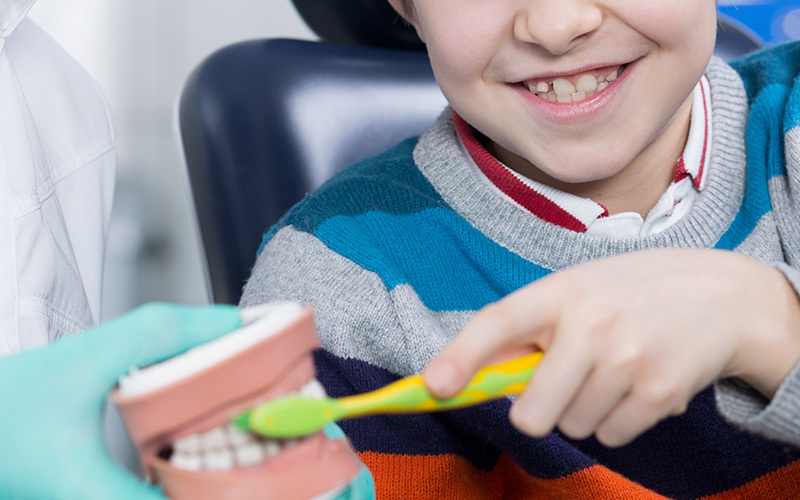Kids with special health care needs can take small steps toward dental visits

This is the second of a two-part series offering dental advice to the parents of children with special health care needs.
A visit to the dentist can be an overwhelming experience for children with special health care needs.
Like many people, they might feel uncomfortable with dental picks and drills. Or, favoring the rhythm of routine, might shy away from just the sight of a dentist’s office. Fortunately, dentists who understand how to treat those with special health care needs can reduce the fear and uncertainty behind dental work and make a visit seem more like an ordinary event.
“The bright lights and loud sounds can intimidate anyone,” says Isabelle Chase, DDS, a senior associate in the Department of Dentistry at Boston Children’s Hospital. Children with complex medical histories can be particularly anxious about a dental appointment because of previous uncomfortable medical experiences, like getting blood drawn.
That’s why children with autism spectrum disorders, cerebral palsy, Down syndrome, and other special health care needs should take gradual steps toward being comfortable with dental work. The first trip can simply be devoted to walking into the office lobby, while subsequent visits can focus on meeting the dentist or sitting in the chair for a few minutes.
If your child struggles with the idea of a dental checkup, you shouldn’t delay an exam and teeth cleaning for long. Your child’s resistance to a visit or consistent dental hygiene practices at home could lead to poor oral health. (Read part one of this series.)
Research shows children with special health care needs have a higher risk of dental disease, says Nicole Baumer, MD, director of the Down Syndrome Program and a physician in the Autism Spectrum Center. Some may also have habits like grinding their teeth, repetitively picking or biting their lips, or placing objects in their mouth, all of which can affect oral health, she says.
Find a dentist who accommodates special health care needs
The first step toward lessening your child’s concerns and fears is finding a dentist who regularly cares for children with special care needs. Your child might be hypersensitive to strong smells, tastes, and textures, or they might dislike having people or objects near their faces and mouths, Dr. Baumer says. A dentist who understands these behaviors will know how to accommodate your child.
Dentists who have experience working with kids with special health care needs usually encourage parents to call ahead of a visit to discuss their child’s emotional triggers — bright lights, certain noises — so office staff can prepare accordingly. They might also offer a survey you can fill out with your child, who might ask to have the dentist’s chair placed upright or to watch a favorite movie or hear certain music.
Your child might also want other small things that are big to them: noise-canceling headphones, a weighted blanket, sunglasses, or handheld mirror to follow along. “Maybe it’s having the dentist talking less or even turning off the radio; those are simple adjustments,” Dr. Chase says.
Children with Down syndrome usually respond well to encouragement after each step of an exam or procedure, which is known as behavior chaining. See if your child’s dentist will take the time to offer positive reinforcement throughout a visit.
Also, parents of children with cerebral palsy should speak with the dental team about how their child can avoid gagging or aspirating during dental work. A dentist will most likely make sure a suction device is close at hand, but it doesn’t hurt to double-check. Dr. Chase has a trick to help stop gagging: a few grains of salt on a patient’s tongue, which can switch the patient’s focus to the senses working at the front of the mouth and lessen tension in the back.
Building trust between a dentist and young patient
Dr. Chase stresses that as long as your child has no pain or infection in the mouth, they don’t need to be rushed into an exam or cleaning on that first visit. “There are very few parts of the first dental visit that need to be addressed immediately,” she says. “The biggest thing is earning their trust. That takes time.”
At home, you can prepare your child by showing pictures of the dentist or watching videos made to help children understand the expectations of a dentist visit. A task chart that outlines each step of an exam or procedure might also help.
You can also tell your child that an initial visit will only consist of the dentist counting and brushing their teeth, and nothing more. Reward them after each visit with a favorite toy or activity. If you give them a snack, for the sake of dental hygiene, make sure it’s not sticky.
“There’s nothing more rewarding to me than watching a child who is scared start trusting me over time and eventually feel comfortable,” Dr. Chase says. “It’s all about taking these little steps to make them feel at ease.”
Learn more about the Department of Dentistry or make an appointment.
Related Posts :
-

Parents: Start dental care early for children with special health care needs
This is the first of a two-part series offering dental tips to the parents of children with special health care ...
-

Cavities are no trick: How to balance Halloween candy with healthy teeth
Believe it or not, dentists don’t dislike Halloween. They don’t secretly wish for kids to not eat candy. ...
-

Teething: Which remedies are safe for babies?
The arrival of your infant’s first tooth is a milestone. But it can also signal the beginning of a ...
-

Save that shot and your child’s teeth: The benefits of mouthguards
Competitive sports can get intense. They can also get physical, with athletes inadvertently colliding and balls moving fast at all ...





